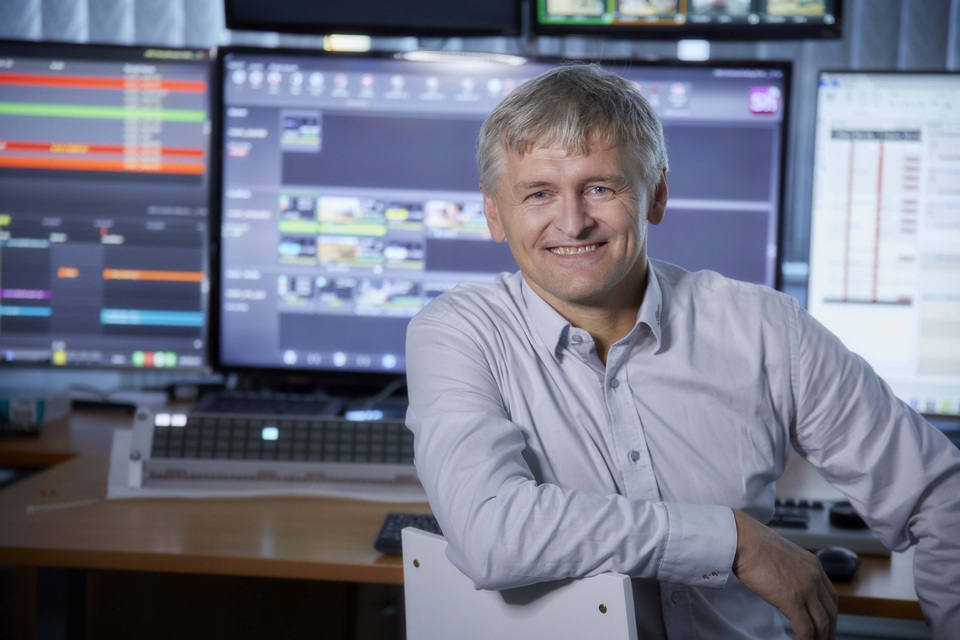Pavel Potužák, Aveco’s CEO, in the TKT1957 survey «The year 2030: AI or engineer?».
- How will the broadcasting industry and broadcast technologies change in the next 5 years?
- If we model the world of broadcasting and broadcast tech in 2030, what role will AI play?
- How will AI change your business segment?
- Which professions will AI displace in the broadcasting technology industry by 2030?
- First we have to think about the foundation of this industry. It is rock solid, and there actually are two strong foundations. One – people want to be entertained. This applied thousands of years ago, even more it applies today, and will do in the future, too. Second foundation is rather unspoken, but as strong, if not stronger: the rulers of the world absolutely need this industry to influence, manipulate, lead the masses. This industry is destined to boom forever.
Yet, we all see the changing landscape. New technologies support new habits of the consumers (or vice versa). Small mobile screens teach viewers not to care about technical quality, thus the pride of broadcast engineers is fading away. Viewers also are not able and not willing to concentrate on long form artistic programs, they consume an avalanche of short clips provided by TikTok or YouTube.
Anybody with a mobile phone and creative brain can produce attention catching programs.
While the global ad budget is growing, it is spread across much wider landscape of content providers, thus a share per broadcaster is smaller.
So, where this all will go? Nobody knows. What is left for us is to keep trying, keep adapting, see which technical hype will transform into useable concept and which one silently dies.
2. Well, the program assets, movies, shows, are not an art anymore. They are consumables. To produce a consumable in a profitable way, everything is allowed. Thus, AI will (or is today) produce scripts, and of course draw scenes and produce videos.
In the text industry it is here already. Articles in online magazines and on social media are being written by AI. What is funny: there is AI producing articles, and there is another AI reading them. People are not capable of reading the tons of texts, so AI is utilized to read it and provide a summary.
Will we see the same in the media industry, artificial creators producing movies for artificial viewers? I am sure yes.
3. Asking how AI will segment is not really the right question. The question is, what do you want AI to be capable of doing and can it be taught the task? AI can’t do everything today, and I doubt it will be able to do everything in 2030. But as the saying goes…”time will tell”.
- We’ve seen technology demonstrations where AI “tries” to direct a program. Some programs are easier than others. News is different than sports, which are both significantly different than entertainment. The emotional element increases as you move from one to the other, and AI isn’t emotional (ask Mr. Spock). All it can do is make its best guess at what engages and emotionally impacts an audience more. A human is more capable of doing that. A slow-motion replay is not just where it starts and ends and the speed, it’s adjusting the speed and direction while on air based on the feeling of the director.
And humans are illogical beings (thanks again, Mr. Spock). Directors tell a camera shader to under or over expose for creative impact or even for better visuals for the viewer. Can AI learn that, or will all shading parameters be textbook perfect (and boring)?
Creative tasks are hard for AI. I think they will still be hard in 2030. Engineering and technical tasks, easier for AI. But until we have self-healing systems from manufacturers, I don’t see AI taking over everything.
Even PTZ cameras at a live event or a parabolic microphone…you would think that would be easy. AI sees what all the other cameras and mics are picking up and determines where these devices get pointed…until there’s something unexpected. Sure 99.9% of the time a parabolic mic is aimed at the field and where the action is, but that 0.1% is something unexpected and reacted to by a human.
So, asking what professions AI will displace is difficult, because we don’t know what its capabilities will fully be in 2030. Can AI be taught emotion? Can it be taught to go “off script” and fully comprehend its environment? If AI doesn’t show a viewer something, how will they know that they are missing something?
Basically, how “human” can AI get?
Truly, we at Aveco utilize in our products the silicon-based intelligence, but we prefer the carbon-based intelligence all the time.










